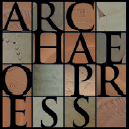
Publishing Scholarly Archaeology since 1997

Download Sample PDF
H 276 x W 203 mm
272 pages
106 figures, 67 tables
Published Apr 2024
ISBN
Paperback: 9781803277431
Digital: 9781803277448
Keywords
Roman Britain; Glass Bottles; Glass; Glassware; Military; Olive Oil
Related titles




Archaeopress Roman Archaeology 113
Blue/Green Glass Bottles from Roman Britain
Square and Other Prismatic Forms
By H.E.M. Cool
Paperback
£50.00
Includes PDF
PDF eBook
(personal use)
£16.00
PDF eBook
(institutional use)
£50.00
Square bottles came into use in the AD 60s and rapidly became the commonest glass vessel form in the empire. For the next two centuries their fragments dominate all glass assemblages. This book presents a classification scheme for the moulded base patterns which allows their chronological development to be reconstructed.
Contents
Acknowledgements
Preface
Section 1
Chapter 1: Introduction
Chapter 2: The Data
Section 2
Chapter 3: Family 1: Square bottle bases with concentric circles
Chapter 4: Family 2: Square bottle bases framed by circular mouldings
Chapter 5: Family 3: Square bottle bases framed by square mouldings
Chapter 6: Family 4: Square bottle bases framed by angle mouldings
Chapter 7: Families 5-7: square bottle bases without frames
Chapter 8: Hexagonal bottles
Chapter 9: Rectangular and octagonal bottles
Section 3
Chapter 10: Chronological patterns
Chapter 11: Distributions: Geographical and social
Chapter 12: The uses they served
Chapter 13: Summing up
Appendix 1: Base moulds
Appendix 2: Mould parallels
Appendix 3: Bath flask capacity data
Appendix 4: Guide to the Digital files
Bibliography
Index
About the Author
Hilary Cool works within commercial British archaeology providing specialist post-excavation services. For nearly thirty years she has run her own business working with many projects in the professional and academic sectors. She is also a director of Barbican Research Associates, a company specialising in bringing backlog sites to publication. She has published numerous articles and books including The Roman Cemetery at Brougham (Roman Society 2004), Eating and Drinking in Roman Britain (Cambridge University Press 2006) and The Small Finds and Vessel Glass from Insula VI.1 Pompeii (Archaeopress 2016).
Reviews
‘Square bottles came into use in the AD 60s and rapidly became the commonest glass vessel form in the empire. For the next two centuries their fragments dominate all glass assemblages. Hitherto this material has not been exploited to any great extent because there has been no close chronological framework. This book presents a classification scheme for the moulded base patterns which allows their chronological development to be reconstructed. With this it is possible to explore how sizes and capacities changed with time.’ – Epistula XXVII (2024)

 Add to wishlist
Add to wishlist
